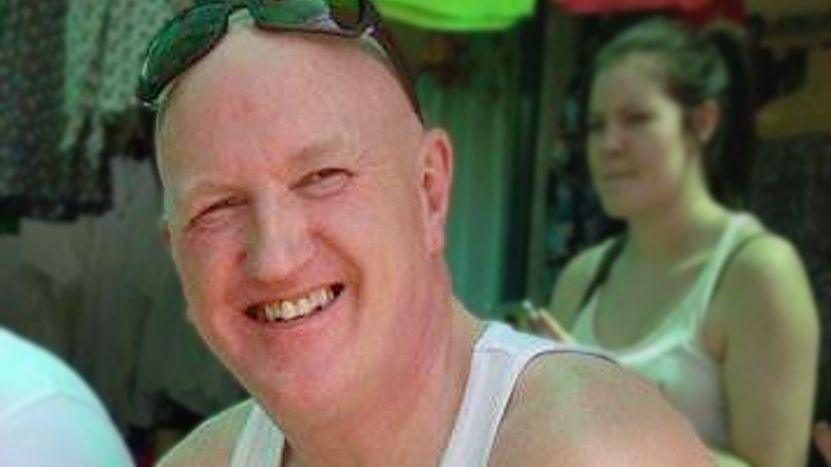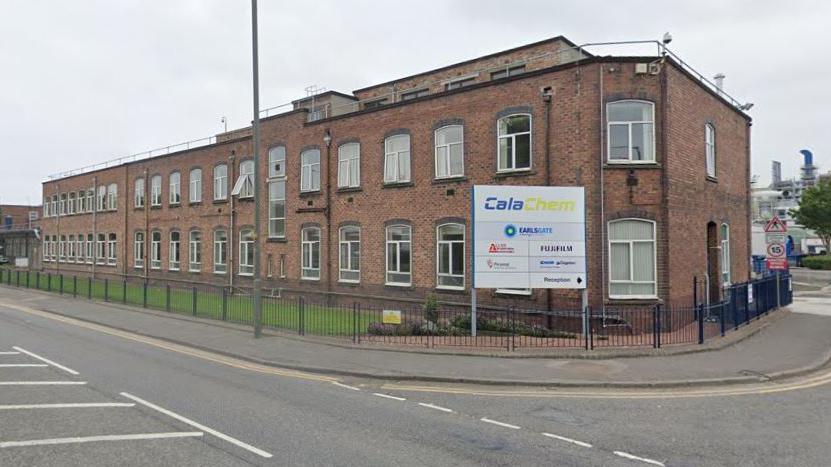Ambulance service errors contributed to death at work

Graham Anderson died at CalaChem Ltd in Grangemouth
- Published
The death of a man who suffered a heart attack at work could have been avoided if a remote paramedic had been contacted sooner, an inquiry has found.
Graham Anderson, who was 59, died at CalaChem Ltd in Grangemouth where he worked as a stores assistant in May 2020.
Sheriff Keith O'Mahony said the Scottish Ambulance Service (SAS) "lost sight" of Mr Anderson for an hour as a result of the error.
The SAS said it had been a "tragic case" and apologised to Mr Anderson's family.
The inquiry was told that "considerable changes" in the Scottish Ambulance Service's systems had been implemented as a result of the incident.
The fatal accident inquiry, external found that Mr Anderson's death might have been prevented if the advanced paramedic coordinator (APC) had telephoned the paramedic after allocating the case, to alert him that he needed to triage Mr Anderson as soon as possible.
The inquiry was told that without a follow-up call, the paramedic would be unaware of the incident.
The inquiry was told that Mr Anderson was found on the floor of his office by a colleague between 07:50 and 07:55.
He was tended to by the company's first responders, one of whom subsequently said that Mr Anderson "without a shadow of a doubt" was having a heart attack.
A 999 call was made from the company's gatehouse at 07:57 and a call handler phoned back at 08:03.
The call handler was told Mr Anderson was clammy, his breathing was slower, he was being given oxygen, and that he had no history of heart problems.
The call handler allocated a teal code, meaning no ambulance would be dispatched and the case was referred to the APC for further triage.
The calls to be allocated for triage would display as a "stack" and were allocated on a first come, first served basis.
Remote advanced paramedics (RAP) could not see the stack, so the only way they would know a case had been allocated to them would be when the APC phoned to tell them.
The inquiry heard that the APC allocated the call at 08:07, but did not follow this up with a phone call.
The sheriff noted: "Accordingly, the remote advanced paramedic was unaware the case had been allocated to him.
"In effect this stopped all Scottish Ambulance Service management of Mr Anderson's condition.
"No ambulance had been dispatched, nor had anyone been tasked with following up additional triage."
The inquiry heard that the APC believed the failure to phone the remote advanced paramedic may be due to her receiving "an unrelated call at the critical moment, or some other distraction, but could not be certain."

Mr Anderson died in his office at CalaChem in Grangemouth in May 2020
The inquiry was told that another 999 call was made from CalaChem at 08:34 to find out when an ambulance would arrive.
The sheriff wrote: "It is clear from the terms of the call that those on site anticipated an ambulance was being or had been dispatched."
Around an hour after the call had been allocated to the RAP, the APC was approached by one of the control room managers, who had noticed that the call had not been actioned.
After the remote paramedic was contacted by the APC, the call was immediately upgraded to a red code and an ambulance was dispatched.
Shortly before ambulances arrived at 09:22 and 09:30, Mr Anderson's condition deteriorated and he had stopped breathing and lost consciousness twice.
Despite the paramedics' efforts, Mr Anderson died at 10:21.
'Reasonable precaution'
Sheriff O'Mahony noted that the APC was an "open and honest witness" with an "impressive history of employment with the Scottish Ambulance Service and throughout her professional career."
He wrote: "Any common sense reading of the evidence in this case confirms that the failure to notify the remote advanced paramedic following the allocation of Mr Anderson's case from the "stack" was critical, it led to inaction for approximately one hour."
He added that a reasonable precaution that might have avoided the death was if the APC had contacted the RAP upon allocation of Mr Anderson's case.
He concluded: "I am satisfied that the delay in making the phone call can be attributed to the multitude of tasks expected of the APC within that system of working and therefore contributed to the death."
The inquiry heard that the Scottish Ambulance Service triage system had now "moved far beyond" what it was at the time of Mr Anderson's death.
The changes implemented include the APC now phoning the RAP before the case is allocated for triage.
A Scottish Ambulance Service spokesperson said: "This is a tragic case and we would like to apologise again to Mr Anderson's family.
"An investigation into the circumstances relating to the delay in responding to Mr Anderson was conducted and completed prior to this inquiry, with all actions identified being implemented.
"We would like to extend our deepest sympathies to the family for their loss."